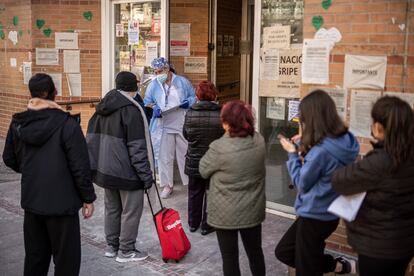Coronavirus quarantine in Spain: When to return to work and what to do if symptoms persist
While a negative test result is not needed to go back to normal life, experts warn that people may still be contagious after the seven-day self-isolation period

Every day, tens of thousands of people test positive for the coronavirus in Spain and have to self-isolate. For workers, this typically means they are off work for a minimum of seven days from the date they started experiencing symptoms, or in the case of asymptomatic cases, when they tested positive. With Spain’s primary healthcare systems completely overwhelmed, regional authorities – which are in charge of healthcare, the Covid-19 vaccination drive and coronavirus restrictions in their territory – are opting to process medical certificates and clean bills of health at the same time. But what happens if symptoms persist? And is a negative test needed to return to normal life?
Spain’s quarantine measures changed over Christmas. The Public Health Commission, which is made up of regional and central health chiefs, decided to reduce the isolation period for positive cases from 10 to seven days. This decision was taken in response to the flood of new coronavirus cases, triggered by the highly transmissible omicron variant, that was threatening to bring the country to a standstill. But not everyone can leave isolation or return to work after a week. According to the protocol, a positive case must be without symptoms for at least three days before breaking quarantine and up until the 10th day of isolation “must exercise caution and reduce social interactions as much as possible, using a face mask at all times.”
If a person continues to have symptoms on the seventh day, they will not be able to break isolation until day 10, after which point, they can go back to living as normal. In Spain, a negative Covid test is not needed to move to this step, a person only needs to comply with the aforementioned quarantine guidelines.
These rules were put into force without the support of the Ponencia de Alertas, an advisory body in charge of creating guidelines and recommending measures, which are later adopted – or not – on a political level. This group, which is made up of specialists from the Health Ministry and regional governments, called for more time to assess the evidence for changing the rules.
Spain’s decision to relax quarantine measures came after the United States shortened the self-isolation period to five days, so long as a person was no longer experiencing symptoms. The reason the US changed its protocol – a move that partly triggered Spain’s decision – is due to the fact that, with the new omicron variant, a person appears to be most contagious between two days before the onset of symptoms and three days afterwards. According to this logic, in most cases, five days should be enough to ensure a person will not spread the virus, and after seven days, the likelihood of contagion is even lower.
For people who have had symptoms during the isolation period, it would be better to take an antigen test to see if they are still positive before returning to workJosé Jiménez, researcher from the Infectious Disease department at King’s College
The United States is not the only country that has cut the isolation period to five days. In Europe, for example, Greece and the United Kingdom have also taken this step. In the UK, however, a person must test negative two times by the sixth day in order to return to normal life.
Some experts are calling for this same measure to be introduced in Spain. Molecular biologist María I. Tapia, for example, warns that after a week, or even after three days with no symptoms, there is no guarantee that a positive case is not still infectious. To ensure this isn’t the case, Tapia believes that a person must take an antigen test before they are allowed to break quarantine and return to work, and should only return to normal life once they have tested negative. This could happen after five or six days, but in some cases, it takes up to 11 days. According to Tapia, the relaxed guidelines in Spain mean that many Covid-19 cases are leaving quarantine too soon and infecting others.
José Jiménez, a researcher from the Infectious Disease department at King’s College in London, agrees: “Although it’s true that the automatic clean bill of health after seven days is going to help reduce the workload in primary healthcare centers, there are people who will return to work without knowing yet if they are carrying the virus. It is a good measure for people who have not had symptoms during the isolation period. However, for those who have, it would be better to take an antigen test to see if they are still positive.”
Tu suscripción se está usando en otro dispositivo
¿Quieres añadir otro usuario a tu suscripción?
Si continúas leyendo en este dispositivo, no se podrá leer en el otro.
FlechaTu suscripción se está usando en otro dispositivo y solo puedes acceder a EL PAÍS desde un dispositivo a la vez.
Si quieres compartir tu cuenta, cambia tu suscripción a la modalidad Premium, así podrás añadir otro usuario. Cada uno accederá con su propia cuenta de email, lo que os permitirá personalizar vuestra experiencia en EL PAÍS.
¿Tienes una suscripción de empresa? Accede aquí para contratar más cuentas.
En el caso de no saber quién está usando tu cuenta, te recomendamos cambiar tu contraseña aquí.
Si decides continuar compartiendo tu cuenta, este mensaje se mostrará en tu dispositivo y en el de la otra persona que está usando tu cuenta de forma indefinida, afectando a tu experiencia de lectura. Puedes consultar aquí los términos y condiciones de la suscripción digital.








































